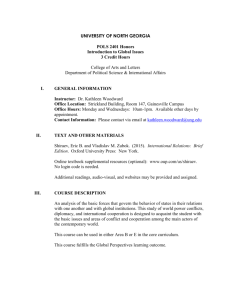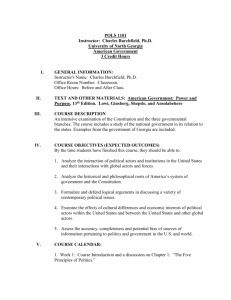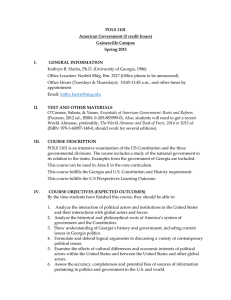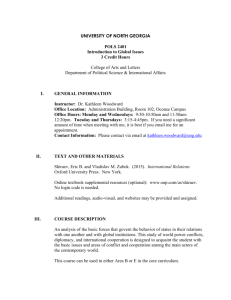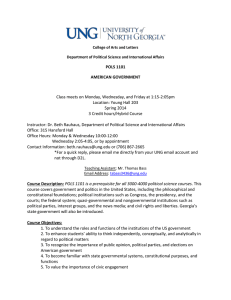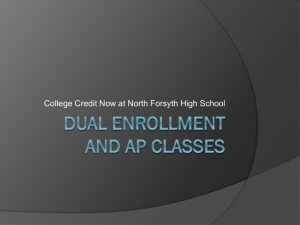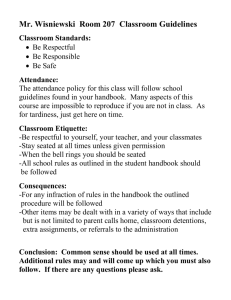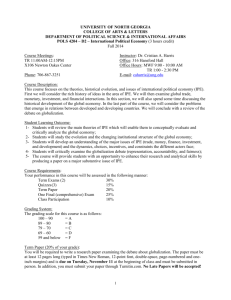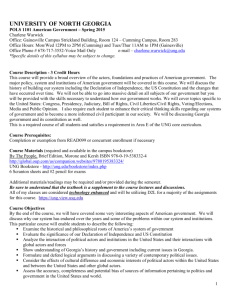UNIVERSITY OF NORTH GEORGIA POLS 4201 Comparative
advertisement
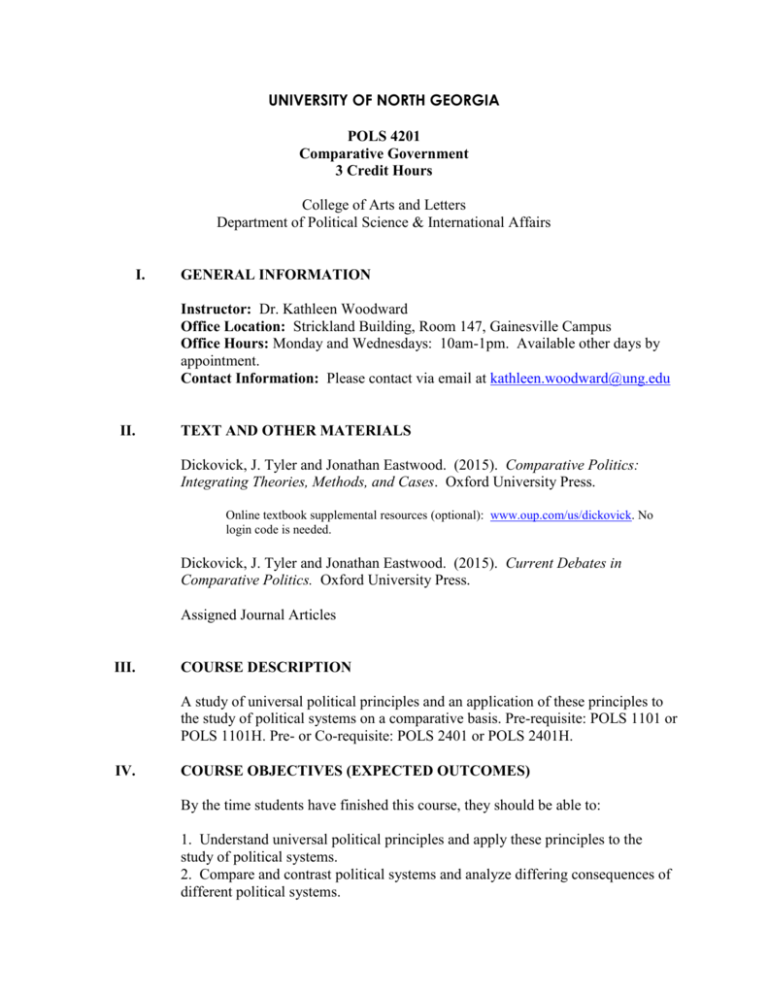
UNIVERSITY OF NORTH GEORGIA POLS 4201 Comparative Government 3 Credit Hours College of Arts and Letters Department of Political Science & International Affairs I. GENERAL INFORMATION Instructor: Dr. Kathleen Woodward Office Location: Strickland Building, Room 147, Gainesville Campus Office Hours: Monday and Wednesdays: 10am-1pm. Available other days by appointment. Contact Information: Please contact via email at kathleen.woodward@ung.edu II. TEXT AND OTHER MATERIALS Dickovick, J. Tyler and Jonathan Eastwood. (2015). Comparative Politics: Integrating Theories, Methods, and Cases. Oxford University Press. Online textbook supplemental resources (optional): www.oup.com/us/dickovick. No login code is needed. Dickovick, J. Tyler and Jonathan Eastwood. (2015). Current Debates in Comparative Politics. Oxford University Press. Assigned Journal Articles III. COURSE DESCRIPTION A study of universal political principles and an application of these principles to the study of political systems on a comparative basis. Pre-requisite: POLS 1101 or POLS 1101H. Pre- or Co-requisite: POLS 2401 or POLS 2401H. IV. COURSE OBJECTIVES (EXPECTED OUTCOMES) By the time students have finished this course, they should be able to: 1. Understand universal political principles and apply these principles to the study of political systems. 2. Compare and contrast political systems and analyze differing consequences of different political systems. 3. Understand and explain regime types and regime change. 4. Analyze the relevance of various factors and actors in society, the economy, and government for how they influence regime maintenance and change, politics, and economic development. V. COURSE CALENDAR Classes begin at noon Jan. 5 Holiday, no class: Jan. 19 Last day to withdraw from course: Feb. 27 Spring Break: March 16-21 Class Will Not Meet - Professor’s Conference: Weds. April 15 Classes End: April 24 Final Exam: Monday April 27, 12:40-2:40pm VI. COURSE POLICIES Attendance: Attendance and participation may be considered in calculating your final grade if you are close to the borderline of a grade. Announcements are made and explained in class and it is difficult to do well in the class if you are not connected through regular attendance. Attentiveness, in addition to participation, in class is considered when adjusting borderline grades. Make-up information: Students need to inform me via email if they will miss a test, quiz, or assignment deadline prior to the due date and time. The reason must be a verifiable medical or emergency situation that is more serious than a cold, headache, etc. Students are not automatically entitled, as they were in high school, to make up exams, quizzes, and assignments, unless the absence is excused for a verifiable medical reason. You need to be present for all tests, etc. I understand situations do arise that prevent presence, even family and childcare issues, but please follow the above guidelines and email me. Do not just assume you can make up the test or assignment. This is a major difference between college and high school of which you need to be aware. General Classroom Policies Please refer to the below link (Student Handbook) for information regarding UNG policies for attendance, disruptive behavior, withdrawals, etc.: http://ung.edu/student-involvement/_uploads/files/studenthandbook/UNG_Handbook.swf VII. COURSE GRADING Test I: 20% of final grade. Tentative test date: Feb. 11th Essay I: 5% of final grade. Due the day of test I. Test II: 20% of final grade. Tentative test date: March 11th Essay II: 5% of final grade. Due the day of test II. Test III: 20% of final grade. Tentative test date: April 13th Essay III: 5% of final grade. Due the day of test III. Class Teaching and writing: 10% of final grade. These will occur throughout the semester. You will be assigned a date. Comparative Analysis Paper: 15% of final grade. Due on day/time of final exam (See date listed above under “Calendar.”) VIII. SUPPLEMENTAL COURSE INFORMATION Student Disability Services Please see the following link for information: http://ung.edu/academic-affairs/policies-andguidelines/supplemental-syllabus.php Academic Integrity Policy: University of North Georgia’s honor policy is below: “On my honor, I will not lie, cheat, steal, plagiarize, evade the truth, conspire to deceive, or tolerate those who do.” See the link below to the student handbook, beginning on page 33, for information and policies regarding plagiarism. http://ung.edu/student-involvement/_uploads/files/student- handbook/UNG_Handbook.swf This link also outlines student code of conduct violations’ procedures and is found on the Dean of Students website: http://ung.edu/dean-of-students/student-code-of-conduct/index.php Early Alert/Early Intervention Program: “I am committed to your success in this course and at this university. I may, therefore, refer you to other persons and/or services available to help you achieve academic success. In turn, if you are referred, you will be expected to comply with the referrals. Please understand that such referrals are not a form of punishment, rather, they are intended to help you. UNG has implemented an Early Alert/Early Intervention program. I am a participating faculty member in the program. I may, then, refer you to other persons and/or services at the university designed to help you achieve your academic goals. You, in turn, will be expected to take advantage of the help offered to you. As your teacher I am committed to your academic success, not only in this class, but at this university. If I feel you would benefit from some of the special services available to students, I will make the appropriate referral. I will, further, expect you to comply with the referral and take advantage of the services offered.” Statement Composed by the Recruit Back, Early/Alert Intervention Team, 2006 * (Specific details of this syllabus may be subject to change.)
